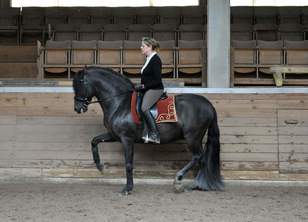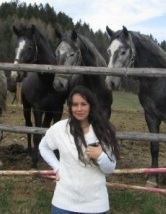 photo by Martina Poly, Owner of horse in Germany.
photo by Martina Poly, Owner of horse in Germany. "Dressage is more than just learning how to ride. Dressage is a way of life. As you learn more about horses ... and the beauty of creating something in a horse ... you find that this process becomes how you ask yourself about what is right and wrong in your own life. Because when you work with a horse, you are not just dealing with the problems in this horse , but also with the problems in your life. People grow through their riding. Or you don't grow. You have a choice, but the opportunity is there."I deal with hundreds of horses -- horses that have been handled correctly and incorrectly, all with different problems and talents. And I may not know anything about their histories, but I have to learn to understand them at that moment. With this creature we've chosen to confine, we have the responsibility to learn how to make its confinement as pleasant as possible. Not just tolerable, but pleasant, because he liked it when he was free, and he can only be beautiful when he likes where he lives and how he's being treated.
"Which is why I think everyone who rides has the responsibility to learn to ride at least to a certain level, so that the horse is comfortable carrying him around. A badly ridden horse is never a happy horse. Badly ridden horses develop problems they'd never develop in the wild. A poor-sitting rider or poorly-fitting equipment causes soundness problems. And even if the horse is so strong that it won't go lame, it will develop temperament problems.
"And handling on the ground is also a horse's environment. If a horse is being unfairly handled, or even brushed too hard, he'll react. If you go into a stable and see a horse that just stands in a corner, this is very uncharacteristic of natural horse behavior, because a horse in nature is totally interested in his life, and has to be to stay alive. You may have to remember, the animal has no say-so in what will happen to it; you're totally responsible for its well-being. And that's really how I see my duty with respect to dressage: to teach people how to make their horses' lives more comfortable.
"The horse must be allowed to be a horse and to develop its character. Correct dressage and correct handling develop the horse's character. They become perkier, and more confident in themselves. They stop shying because they feel confident in their world. And their bodies become more beautiful through correct dressage, and they live longer and healthier lives. We take away the horse's freedom, but we give something back. We develop the horse's mind."
(©1996 Hunter & Sport Horse, January/February)
"Which is why I think everyone who rides has the responsibility to learn to ride at least to a certain level, so that the horse is comfortable carrying him around. A badly ridden horse is never a happy horse. Badly ridden horses develop problems they'd never develop in the wild. A poor-sitting rider or poorly-fitting equipment causes soundness problems. And even if the horse is so strong that it won't go lame, it will develop temperament problems.
"And handling on the ground is also a horse's environment. If a horse is being unfairly handled, or even brushed too hard, he'll react. If you go into a stable and see a horse that just stands in a corner, this is very uncharacteristic of natural horse behavior, because a horse in nature is totally interested in his life, and has to be to stay alive. You may have to remember, the animal has no say-so in what will happen to it; you're totally responsible for its well-being. And that's really how I see my duty with respect to dressage: to teach people how to make their horses' lives more comfortable.
"The horse must be allowed to be a horse and to develop its character. Correct dressage and correct handling develop the horse's character. They become perkier, and more confident in themselves. They stop shying because they feel confident in their world. And their bodies become more beautiful through correct dressage, and they live longer and healthier lives. We take away the horse's freedom, but we give something back. We develop the horse's mind."
(©1996 Hunter & Sport Horse, January/February)

 RSS Feed
RSS Feed